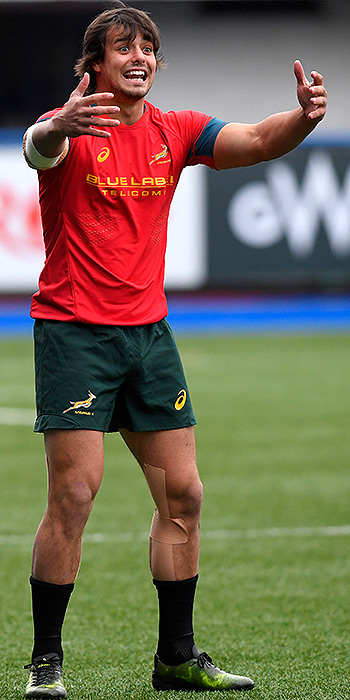Here are the Springbok 'fixables'
If South Africa were playing Iceland this Saturday, there would still be an uneasy feeling amongst Springbok supporters.
That is the state of uncertainty in Springbok affairs.
It is not a new state of affairs. Remember the seven defeats in a row in 1964 and 1965? That was in Test matches. On the 1965 tour to Ireland and Scotland, the Springboks played five matches and did not win a single match.
Remember 3-53 loss to England at Twickenham in 2002 and 0-49 loss to Australia in Brisbane in 2006 and a 6-33 defeat in Christchurch in 2007.
New Zealand beat South Africa 33-6 in July. In October SA won the World Cup, not New Zealand.
Even this bizarre series of defeats in 2016 must be fixable.
The Springboks have played 11 Tests this year and lost seven.
Even in the four that they won – Ireland in Johannesburg and Port Elizabeth, Argentina in Nelspruit and Australia in Pretoria – they were not the better side, they did not deserve to win.
It has been a year to equal 1965. But when next they won in 1965, it was to beat New Zealand in Christchurch.
There's nothing so bad that couldn't be worse and, in fact, nothing so bad that could not be better.
This is not an attempt to kick people when they are down even if Oscar Wilde thought there was no better time to kick a man than when he was down. But then Wilde was not a rugby player.
Let's look for fixables – as happened in 1967 and 2007.
First, let's look at motivation, which most often comes from coach/management and captain, though it seems odd that Springboks can get no motivation from simply pulling on the jersey. But a team that chases kicks so badly, mauls in a desultory fashion and is thrashed for the post-tackle ball can hardly be a motivated TEAM.
Secondly, look to the scrumhalf.
The great Stephen Fry, the Springbok captain and rugby thinker, said often that you should pick your scrumhalf first and he should be your best player.
He has a point. But if your scrumhalf arrives late, wastes time, crabs across the field, stands up to shovel an erratic pass then the link between the forwards' work and the backs ambitions is broken. Against Italy, he kicked three times and three times the Italians had a free ball to play with – either because the scrumhalf kicked too far or because the possible chasers lack interest in chasing kicks.
Why does the scrumhalf wait before picking up the ball? It does nothing for this pod of forwards who are waiting for the ball but it does help the opponents to get organised, but the worst is crabbing across the field. While he takes two or three little sideways steps of no purpose, the opponents can race five or six metres into your backs' space. No wonder the backs lack rhythm.
In days when scrumhalves did not have the sort of inviolability that they have now, scrumhalves could simply not crab and shovel. They took no steps, passed off the ground with their heads down and their eyes on the target. In passing, they were advised to imagine a plate of glass over their heads and to stay under that plate of glass in their pass. That would prevent a pass from curling upwards. They aimed to pass in front of the flyhalf no higher than his waist.
Why should that not apply now?
Thirdly, the maul. South Africa started the tactic of kicking a penalty out five metres from the line and then mauling the line-out over for a try. The All Blacks wanted it banned and South Africa fought hard to keep it. Then along comes a Saturday afternoon in Florence. South Africa threw into six five-metre line-outs without ever looking like scoring as the Italians countered them comfortably. The Italians threw into three five-metre lines, scored a try, advanced on another and won a penalty and came within a sliver of boot on a sliver of touchline away from scoring at the third. The match was against Italy, not England. (The All Blacks, who wanted the maul done away with, also beat us at the maul.)
Tackles. Italy won the turnovers nine to one. Policy or technique or apathy must be the cause of such a stat. Our tackle strategy may just be the worst in the world. We involve more players than anybody else and produce slow ball – if we get the ball at all.
Line-outs. Remember Victor Matfield and how he ruled the world's line-outs, his own and the opponents'? Now the Springboks barely compete on opponents' throws. Who decides that?
Kick-offs. Who decides on the unimaginative, repetitive kick-offs and the unprofitable 'exit strategy'?
Defence. Who decides on the apparent value of unpressurising defence?
We could go on. We could blame gameplan and we could blame execution. The team and its management would know which is true. Possibly both.
Fitness. It certainly looks suspect. If it really is lacking, that is a disgrace.
Selection. Pick players for the way they play and then letting them play that way – not forcing players to change in order to fit some mysterious plan, forcing square pegs into round holes. Oh, and not picking players out of position.
But surely, wherever the faults are they are fixable.
By Paul Dobson
@rugby365com





































